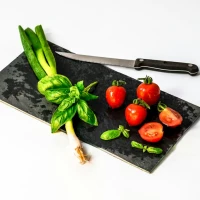Watermelon: a staple of picnics, barbecues, and summer refreshments. It’s the fruit that’s synonymous with sunshine and good times. But behind every juicy bite is a technique that, when mastered, can elevate your fruit platter from simple to extraordinary. Today, we dive deep into the art of crafting perfect watermelon triangles, ensuring your presentation is not only aesthetically pleasing but also practical for enjoyment.
In this comprehensive guide, we’ll walk you through the process step-by-step, imparting pro tips and tricks that will streamline your watermelon cutting journey. We’ll help you unlock the secrets to watermelon cutting mastery, whether you’re prepping for a family gathering, a friend’s party, or simply indulging in a refreshing treat for yourself.
The Preliminaries: Proper Watermelon Selection and Preparation
Before you wield your knife and start creating those stunning watermelon triangles, choosing the right watermelon is essential. Not all watermelons are created equal, and your cutting skills will shine brightest with the perfect canvas.
How to Pick the Right Watermelon
Here’s what to look for when selecting your watermelon:
- Look for uniformity: A uniform shape indicates even ripening.
- Examine the field spot: This is the area where the watermelon rested on the ground. A creamy yellow spot suggests ripeness.
- Give it a tap: A ripe watermelon will have a deep hollow sound when you thump it.
- Check the weight: A heavier watermelon for its size means more water content and juiciness.
Preparing Your Watermelon for Cutting
Safety and cleanliness are just as crucial as the cutting technique itself. Follow these preparatory steps:
- Wash the watermelon: Clean the rind to avoid transferring dirt or bacteria to the flesh.
- Gather the right tools: A sharp chef’s knife and a sturdy cutting board are key.
- Stabilize the watermelon: Use a towel underneath to prevent the watermelon from slipping.
Step-by-Step: Cutting Your Watermelon into Triangles
Cutting a watermelon into triangles involves more than just slicing. It requires precision and a methodical approach. Here’s how to achieve perfect watermelon triangles every single time.
Setting the Stage: Initial Cuts
- Slice off the ends: Remove both ends of the watermelon to create flat surfaces.
- Stand it up: Place the watermelon on one flat end, ensuring it’s stable.
- Halve the watermelon: Cut down through the center to split it into two equal halves.
Crafting the Ideal Triangles
- Lay the halves flat: Place the halves cut-side down on the cutting board.
- Slice into strips: Cut each half into even vertical strips, about 1 to 2 inches wide.
- Create the base of the triangle: Cut perpendicular to the initial strips to form triangles.
Extra Tips for Perfect Triangles
- Maintain evenness: Keep the width of the strips consistent for uniform triangles.
- Control your knife: Use smooth, confident cuts to ensure clean edges.
- Adjust angles for size: Alter the angle of your perpendicular cuts for larger or smaller triangles.
Advanced Watermelon Triangle Techniques
Once you’ve mastered the basics, it’s time to up your game. Stunning presentations can be a competitive edge for those eyeing top spots on the summer fruit platter scene.
Creative Cuts for an Artful Display
- Vary triangle sizes: Combine big and small triangles for a playful look.
- Include the rind: Keep a strip of rind on each triangle for a handle, making them easier to pick up and eat.
Presentation Perfection
Arranging your watermelon triangles isn’t just about tossing them on a plate. Showcase your artistry:
- Layer for effect: Overlap triangles in a spiral or flower pattern.
- Add complementary fruits: Use grapes, berries, or other fruits to enhance your display.
Keeping It Fresh: Storing Your Watermelon Triangles
The longevity of your watermelon triangles is just as important as their initial presentation. Handle storage like a pro to maintain freshness.
Ideal Storage Tips
- Use airtight containers: This prevents the watermelon from absorbing other flavors in the fridge.
- Serve soon after cutting: Watermelon triangles are best enjoyed fresh, so aim to serve them within a day.
- Consider refrigeration time: Chilled triangles can be more refreshing, so plan your cut time accordingly.
Mastering Speed and Safety in Watermelon Cutting
Speed may come with time, but never at the expense of safety. Here are some pointers to keep in mind:
- Sharpen your knife: A sharp knife is safer, as it requires less force and provides more control.
- Use proper technique: Guide your knife with your non-dominant hand safely away from the blade.
- Work methodically: Do not rush the process; speed will come as you become more comfortable with the steps.
Watermelon Cutting FAQs
In this section, we answer some frequently asked questions that might arise during your watermelon cutting journey.
How do you cut a watermelon without making a mess?
- Slow and steady: Take your time, and be deliberate with your cuts to reduce juice splatter.
- Drain excess juice: After the initial cuts, let the watermelon drain for a few minutes.
Can watermelon triangles be frozen for later use?
- Freezing is an option, but be aware that the texture will change once thawed.
- Use frozen triangles for smoothies: They can be a great addition to cold beverages or smoothies.
Tools and Equipment for the Job
It’s not just about technique; the right tools can make a world of difference.
Essential Watermelon Cutting Tools
- Chef’s knife: A sharp, long blade is crucial.
- Cutting board: Ensure it’s large enough to accommodate the watermelon.
- Melon baller (optional): For scooping out any remaining watermelon flesh for additional presentation options.
Navigating Watermelon Varieties and Cutting Techniques
With countless watermelon varieties out there, your cutting technique might need to be flexible.
Adjusting for Different Types of Watermelon
- Seedless vs. seeded: Be mindful of seeds, as they can affect the slicing process.
- Size considerations: Smaller melons require less force; larger ones might need a two-step cutting approach.
Embracing Sustainable Watermelon Cutting Practices
As we indulge in the delights of watermelons, let’s not forget about sustainability.
Reducing Watermelon Waste
- Use the entire fruit: Watermelon rinds can be pickled or used in recipes.
- Compost: If you have access, composting watermelon scraps is a great eco-friendly option.
Conclusion: Carving Your Path to Watermelon Cutting Mastery
Cutting watermelon into perfect triangles isn’t just a culinary skill; it’s an art form—one that requires practice, patience, and a bit of creativity. Armed with the knowledge from this guide, you’re now equipped to tackle watermelon cutting like a pro. Whether it’s for a daily snack or a lavish party display, those perfect watermelon triangles will no doubt become your signature summer treat.
Remember, every slice counts. It’s not just about feeding your guests or satisfying a craving; it’s about crafting an experience. With every watermelon triangle you serve, you’re sharing a piece of artistry, a moment of joy, and a burst of freshness. So, embrace the process, refine your technique, and watch as your perfect triangles become the highlight of any table.










